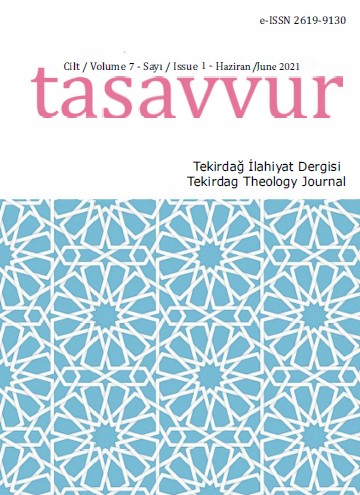İbnü’l-Arabî’nin İlimleri Sınıflandırması ve Fârâbî ile Bir Karşılaştırma
Ibn al-ʿArabī’s Classification of Sciences and a Comparion with al-Fārābī
Author(s): Abdullah KartalSubject(s): Epistemology, Islam studies, Religion and science , Philosophy of Middle Ages, Philosophy of Religion
Published by: Tekirdağ Namık Kemal Üniversitesi İlahiyat Fakültesi
Keywords: Philosophy of Religion; Ibn al-ʿArabī; Al-Fārābī; Classification of Sciences; Mysterious Sciences; Sciences of Unveiling; Rational Sciences;
Summary/Abstract: The notion of classifying sciences has a quite along past in the history of philosophy. The aim of this study is to set forth and analize Ibn al-ʿArabī’s (d. 638/1240) classification of sciences at first, and then to make a comparison with al-Fārābī’s (d. 339/950) classification. Making such a comparison between Ibn al-ʿArabī, who is a unique representative of Islamic mystical thought, and al-Fārābī, who is a mighty representative of peripatetic Islamic philosophy, will conribute to seeing the epistemological views of sufism and classical Islamic philosophy together. In the study, a descreptive and analytical method has been preferred and it has been reached to some important results by comparing the opinions of Ibn al-ʿArabī and al-Fārābī. In this context, it could be said that while Ibn al-ʿArabī constructs his classification according to the means of obtaining knowledge, al-Fārābī arranges his classification according to the knowledge itself. It is seen that al-Fārābī’s classification includes in details the first two groups, to wit, as Ibn al-ʿArabī calls, the rational sciences and the situational sciences, and excludes the mysterious sciences. On the other hand, Ibn al-ʿArabī makes room as well as for reason besides heart in his epistemology, both by mentioning the rational sciences and asserting that some of the intuitive sciences are in a rational characteristic.
Journal: Tasavvur Tekirdağ İlahiyat Dergisi
- Issue Year: 7/2021
- Issue No: 1
- Page Range: 751-778
- Page Count: 28
- Language: Turkish

